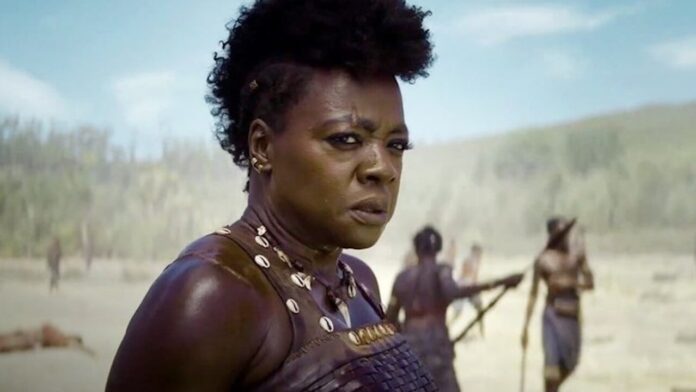The Woman King. Indeed.
The Woman King, a recent American film based on the story of the Mianor (Our Mothers) of Dahomey is under some fiery scrutiny. Deservedly so. Any Euro-American production that attempts to tell any story of Africa should be scrutinized so. Deservedly so. This is normal considering the history of conquests, genocides, rape, colonialism, and violence of European governments and merchants in Africa. The Woman King deserves his/her/its scrutiny.
Another surprise is that the movie has come under fire, not because of any debate about its closeness or deviation from the colonial historical narratives amply present in western media about the Mianor. No—not at all. This film is under immense fire because of its title: “The Woman King.” The proper history of European barbarism in Africa aside, what seems to tickle the furor of western fuhrers of conservatism is the use of the word king to refer to a woman.
Understandably so. On the one hand, in the pagan English, a woman who ascends to a political throne or position in western society is a queen, not a king. To this end, one can appreciate the criticism that the film should have been dubbed instead, “The Woman Queen.” On the other hand, the culture and philosophy of the Mianor does not warrant the use of the translation as king. Nyornufia (in the Fon or Ewe) refers to a Queen-Mother—a woman. Queenmothers in such traditional African societies have always existed alongside kings, who are men. The two are separate political offices with distinct lines of legacy and inheritance.
In Fon-Ewe traditions, queenmothers are sacred. Another way to put this is to say they cannot be sacrificed under any circumstances. Kings are by definition, according to Gbe-Vodun Tradition, sacrificial. For instance, during times of war, the king goes into battle. The queenmother never does! Queens (wives of kings) have a choice to also go into battle under the command of the king. In this sense, the king is the Commander in Chief of the Armed Forces and the queenmother remains a socio-cultural, even spiritual figure of the people. It is only the queenmother who can destool or dethrone a king. No one else can! The queenmother is almost always a grandmother herself.
This endearment to the queenmother (not to queens) is also reflected in how almost all African traditions refer to their ancestral lands: Mother Africa. Not father Africa, not genderless Africa. Not gender neutral Africa. Mother Africa! And by extension the planet: Asaase Yaa, that is The Motherland or Mother Earth. In all these renditions, mother must be protected, died for, maintained and handed down to the next generation by any means necessary. The king honors this charge to “mother” by leading the children (men and women) of the land to greater and better heights. Instead of translating this cultural framework as a social structure of cosmic balance, many societies in the ancient world came to regard African society as matriarchal.
But, let us not lose sight of the matter—The Woman King is a film based loosely on the Kingdom of Dahomey. Not real life. And so the rest of the film, including its title, is coined to entertain the peculiar motives and ideologies of westerners. Nothing more. The title of The Woman King is as real as the title of another film, The Lion King. Not factual. One can name a story, movie, or any other narrative as such: Who made the lion, and not the crocodile of the Nile, the king? The crocodile deserves to ask!
This is where truth-seekers need to be aware. Hollywood, and for that matter all Euro-American funding and filmmaking, is an intrinsic party to Euro-America’s geopolitical stagecraft. The Woman King should not be analyzed or even scrutinized without this context. Film is an extension of politics. Specifically Hollywood Films are extensions of Euro-American geopolitics, and this politics is the extension of the American economic hegemon by other means in much the same manner as all America’s unending wars around the world are extensions of Euro-American politics and economic aspirations by other means. (If I may paraphrase Klausewitz).
In this regard alone, “The Woman King” deserves its name. It is within this psycho-cultural philosophical framework that the title of the film must be appreciated. In the European world or cultural framework, to be a grey man is everything. They call this patriarchy! Indeed, one cannot amount to much unless one can become the grey man or prove allegiance and proximity to male greyness. And for that matter, all aspirations within the European cultural construct are geared towards become not only grey, but becoming men. In this sense, a woman cannot be respected in Euro-American society unless she could become a man and unless she could attain proximity to grey manhood.
The Woman King title is a modest attempt to coax the unsuspecting onlooker to accept that this is an honest attempt to interpret something intrinsically African. But there’s nothing intrinsically African about the interpretation. The title of The Woman King correctly manifests the great power of Euro-American geopolitical stagecraft, and it underscores the mutilation—women and men switching bodies—which is under way in Euro-American society. By titling the film, The Warrior King, the woman’s proximity to manhood is primed—and what is left is only to show in such a film that a warrior falls in love with a grey man—and the proximity to greyness is also firmly established.
This is the only way, in European society, that warrior women can gain such respect. This is the only way that women who want to be warriors in a European nation, can become warriors. There’s no other way. The Euro-American cultural framework is deeply patriarchal, intensely problematic and acutely paralogical. It does not bend to natural reason.










